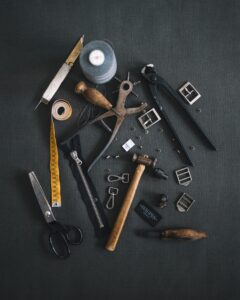
Tools are an integral part of any trade or profession. Not only are they critical for getting the job done—but they’re a physical representation of your business, too.
Poorly maintained tools can impact productivity and negatively affect your business. On the other hand, taking good care of your tools will make them last longer, work better, and save you money on repairs and replacements. You can buy tools from any reliable supplier like RS Components.

Here are four steps to keep your tools in tip-top shape for years to come:
1. Invest in a high-quality tool chest
Finding proper storage is the first step toward keeping your tools in good nick. One option is to keep the container your tools first came in, while another is to invest in high-quality, purpose-made tool chests, containers, and organizers.
This investment will have other benefits, too, such as making your tools more accessible. When your employees can find the right tool quickly, they’ll be much more productive on the job.
Tools stored in a secure chest are also less likely to be stolen or go missing.
Consider adding corrosion and anti-rust liners or silica gel packs to your tool chests for extra protection.
2. Clean your tools regularly
Cleaning tools regularly is a critical maintenance step. Make sure your employees know how to keep their tools clean without causing accidental damage.
The best way to keep your tools clean is to wipe them down after each use, preventing any build-up of grease, dust, or dirt. Avoid using abrasive materials for cleaning unless necessary—a damp cloth and soapy water should be enough in most cases.
For power tools, make sure to unplug and disconnect them from any power source before cleaning. If a tool is rusted, use a stiff brush, applying light pressure to remove build-up.
Before storing tools away, make sure they’re completely dry and free from contaminants. This approach will prolong their lifespan and maintain their condition for many years.
3. Avoid damp, hot, and humid environments
Metal tools, such as screwdrivers and drills, are especially susceptible to excessively damp, hot, or humid environments. Storing your tools under these conditions could lead to corrosion and potentially degrade electrical components.
The best place to store your tools is in an organized, clean, dry space such as an office or air-conditioned workshop. This approach will keep your workspace looking professional and prevent untimely damage to your tools.
Investing in a dehumidifier is also a smart choice if your workspace is prone to high humidity.
4. Follow all safety precautions
Another essential step for maintaining your tools is to use them correctly—this is the best way to prevent damage from happening in the first place!
Instruct your employees to follow all safety regulations and precautions when using tools, including:
- Follow all instructions for tool use,
- Only use tools as intended (i.e., don’t use a screwdriver as a hammer!),
- Wear safety gear, such as goggles, gloves, and hardhats,
- Keep children, pets, and bystanders clear of the work area.
Conclusion
Keeping your tools in optimal condition is all about following the appropriate storage, cleaning, and maintenance protocols. Make sure your employees are aware of these practices to keep productivity high and avoid shelling out thousands on replacing and repairing tools.
